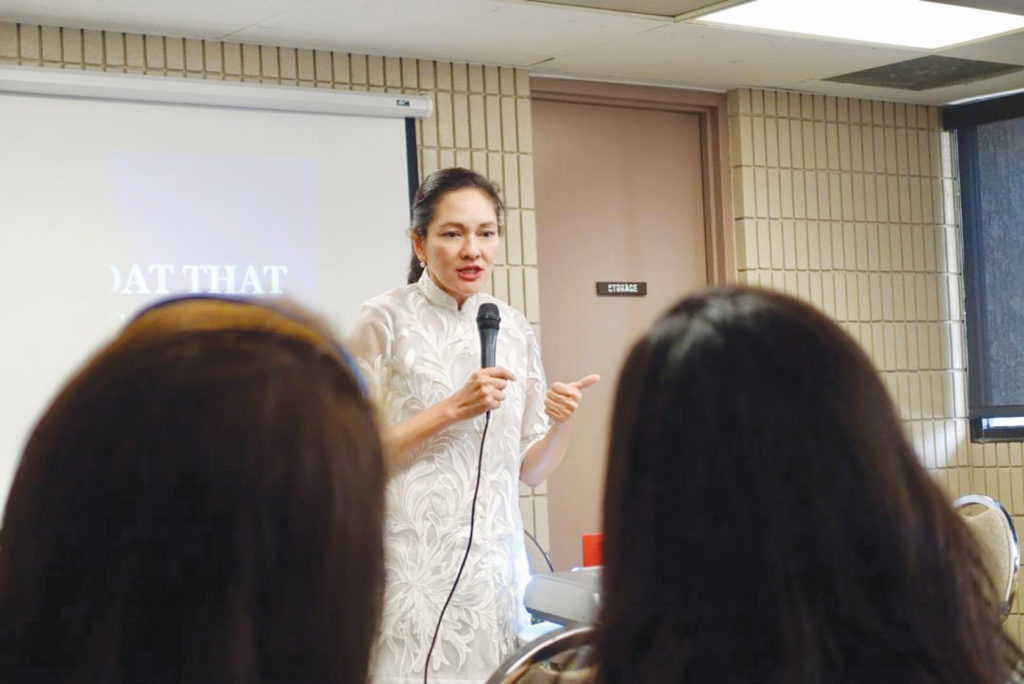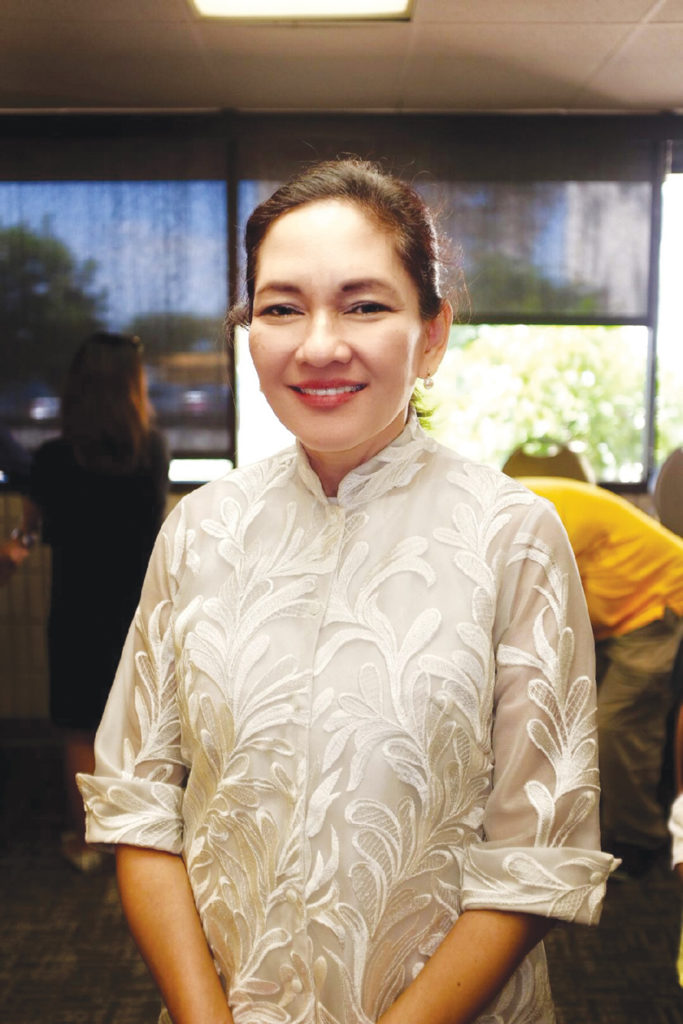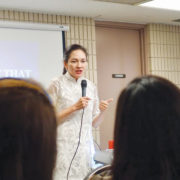
CARSON, California — Philippine Senator Risa Hontiveros met with local Filipino Americans at the city’s Civic Center on Sunday, June 23 to share updates on the recent midterm elections and answer questions.
Her visit came after she voiced concerns last week over the possibility of a joint Philippine-China investigation of the recent maritime mishap in which a Chinese vessel collided with 22 Filipino fishermen aboard their wooden fishing boats in the disputed South China Sea.
The incident sparked outrage after the Chinese fishermen left the Filipino crew sinking in open waters. The 22 Filipino crewmen were later rescued by a passing Vietnam vessel.
Many have criticized Philippine President Rodrigo Duterte — a proponent of a joint investigation — for not taking the collision more seriously.
On Sunday, Hontiveros opened up her talk by describing the “hit-and-run” maritime incident as a “perfect metaphor for the state of affairs in the Philippines.”
“Those 22 Filipino fishers are the Filipino people first victimized by the brute aggression of stronger forces and then made to suffer further from the callousness of those who should have come to their aid the hit-and-run,” said Hontiveros.
“How can you do a joint investigation with a country that made up this fantastic fib that seven or eight of our low-lying bamboo and wooden vessels swarmed and were harassing high steel reinforced Chinese vessel and that it accidentally bumped one of them causing it to sink, but then they were afraid to rescue our fishermen because we would harass them again?” asked Hontiveros, adding that the video footage “put the lies to rest.”
“How can you expect another government, which lied about the incident at the outset, to be an honest broker at the table and to really search for the truth and seek to make reparation for the incident?” she continued. “Let them do their own investigation.”
Hontiveros’ visit also came a month after the 2019 midterm election, which she described as a “critical turning point” in the Philippine political landscape.

Hontiveros — who was elected to the Senate in 2016 — also voiced concern on the outlook of the Philippines under the current administration.
“The systematic deliberate targeted assault on Democracy by the administration was set in motion far long before that,” said Hontiveros.
Since Duterte’s election in 2016, critics have accused his administration of actively silencing his political opponents.
In 2017, Senator Leila De Lima — an outspoken critic of Duterte — was jailed on charges of being linked to drug trade while serving as justice secretary. Critics of the administration argue that charges were based solely on the testimonies of convicted drug lords.
Former Chief Justice Maria Lourdes Sereno was removed from the country’s highest court last year on grounds that she allegedly failed to fully disclose her wealth from years preceding her appointment in 2012. Proceedings to oust such public officials can only be ousted by impeachment, according to the Philippine constitution.
Former Senator Antonio Trillanes currently faces a number of cases including for rebellion, inciting to sedition, and has a libel charge against him.
And it hasn’t only been politicians. Rappler CEO and co-founder Maria Ressa, caught international headlines when she was first arrested and charged for a “cyber libel” lawsuit. Human rights groups saw it as a move against free press in the country.
Hontiveros herself currently has a pending criminal case against her for allegedly kidnapping obstruction of justice, and wiretapping.
“The weaponization of the law isn’t just to suppress the enemies of the state, a spineless judiciary is also used to rubber-stamp executive decisions,” said Hontiveros.
Central to Duterte’s presidency has been his administration’s ongoing war on drugs which Hontiveros said has been “creating a mythical enemy” and “false divisions.”
An official count by the Philippine Drug Enforcement Agency records over 5,000 deaths resulting from the drug war, but human rights groups claim the toll to be nearly 20,000 extrajudicial killings. They argue that killings are targeted at the urban poor instead of focusing on finding kingpin drug dealers.
“How did he manage to get us FIlinios to acquiesce? By demonizing drug users by lumping drug users and drug traffickers together,” said Hontiveros.
On the broader relationship between the Philippines and the U.S., Hontiveros highlighted how the Beijing government has for years been in violation of the Philippines’ environmental laws and the South China Sea ruling of the Hague Tribunal which ruled in favor of the Philippines.
She characterized the relationship between the Philippine and China government as not being one between equals.
“[Duterte’s] relationship with the Chinese government or with Xi Jinping is that of Xi Jinping being the padrone [master] with similar attitudes of obedience and acquiescence even when the padrone has wronged you. There’s this irrational belief that the padrone will make it up to you somehow, sometime in the whatever future. So it’s not a relationship,” said Hontiveros, emphasizing that issues are not with the Chinese people, but the Chinese government.
“Our government must stand as equals with all others in the region,” added Hontiveros.
In relation to the illegal drug trade, Hontiveros pointed to China as being the biggest source of drugs.
“How come they keep on getting smuggled in and while suspected small users and pushers keep getting killed? There’s some hypocrisy going on there,” said Hontiveros.
Making reference again to the maritime incident, Hontiveros said, “This ship will not sink.”
Political polarization, social media, and youth involvement
With nine major political parties in the Philippines, political polarization is nothing new to the country where political alliances and party-switching are common.
In the most recent midterm elections that took place in May, the Philippines Commission on Elections proclaimed 12 new senators — nine of who have openly allied with the Duterte administration including former national police chief Ronald dela Rosa, and Duterte’s former mayoral personal aide Bong Go.
With three independent senators including re-elected Senator Grace Poe, no opposition senators were among the legislative winners in the 2019 midterm elections — a loss that last happened 80 years ago.
“The polarization has to be recognized for what it is — it’s part of where we are right now. We recognize it as a problematic characteristic of where we are right now,” Hontiveros responded to the Asian Journal.
Hontiveros highlighted the role of social media in today’s political landscape, which despite being a place for sharing voices and opinions has also been used for propaganda.
“It’s an original Democratic space for us. No matter the difficulties, we must never surrender it to censorship,” said Hontiveros.
She continued, “There are of course those on all sides who truly believe in whatever they believe in, but there are also those who are employed and there are also those who are not even human beings but bots and their own algorithms.”
Hontiveros also encouraged people to refrain from insulting and labeling others.
“Maybe it’s time to review if these are really the terms of engagement that will bring us forward,” said Hontiveros.
Being a former journalist, she also discussed the problem of fake news and the need for fact-based debates.
“We cannot concede the social media space. We have to win it back for facts and for debate based on facts,” said Hontiveros.
But she also encouraged people to talk more with each other and to ask questions that matter offline.
Touching on youth involvement, Hontiveros said that young people too have increasingly felt the effects of polarization.
“Young people haven’t been spared the polarization of this ‘us versus them’ [mentality], especially with their access to social media,” continued Hontiveros. “Not only have citizens been warned against but have been set upon each other.”
“I think young people either have gotten caught up in or have gotten so turned off. Some of them just unplug from political discourses because maybe if they haven’t articulated it, we can sense it,” she added.
As a message to young people, she expressed hope for Filipino and Fil-Am youth to “fall in love again with citizenship” and being engaged with the government.
“Hang in there. Let us hear your voice come out and show us the shape of your involvement in day-to-day affairs,” said Hontiveros.







